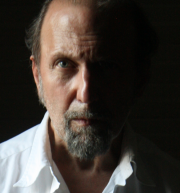George Michelsen Foy
 George Michelsen Foy has worked as a commercial fisherman, a magazine editor, and chief cream-puff transporter in a pastry factory in England. His latest novels are Mettle and The Art & Practice of Explosion (University Press of New England); a non-fiction book, Finding North: How navigation makes us human, will be published by Flatiron Press/Macmillan in 2016. His short fiction has appeared in Notre Dame Review, Monkeybicycle, American Literary Review, et al.: long-form essays in Harper’s, Rolling Stone, Men’s Journal, et al. He was awarded an NEA fellowship in fiction. He lives with his family in Southeastern Massachusetts and in New York City, where he teaches creative writing at NYU.
George Michelsen Foy has worked as a commercial fisherman, a magazine editor, and chief cream-puff transporter in a pastry factory in England. His latest novels are Mettle and The Art & Practice of Explosion (University Press of New England); a non-fiction book, Finding North: How navigation makes us human, will be published by Flatiron Press/Macmillan in 2016. His short fiction has appeared in Notre Dame Review, Monkeybicycle, American Literary Review, et al.: long-form essays in Harper’s, Rolling Stone, Men’s Journal, et al. He was awarded an NEA fellowship in fiction. He lives with his family in Southeastern Massachusetts and in New York City, where he teaches creative writing at NYU.
Ferguson
How wrong to walk the streets dressed how you dress and know those codfish eyes will follow you always, how wrong to know that voice with sharpened fricatives will slice a path to stop—hands pale as non-fat slap your thighs apart twist your head and depending on what you’ve done (and you’ve always done something) click chill around your wrists: and if you say no? And if you run or just move wrong? The voice that worms out, flattened by electrics and satellite, from your mom’s/ girl’s/ grannie’s/ dad’s cell phone will be a voice they do not know: that never said ‘Wait, I got a joke for you,’ nor ‘Happy birthday’ nor ‘Fuck you’ even: how wrong for someone they never met to say, ‘I’m sorry, but I must inform—
Sabotage
Tournan en Brie lies a little east and south of Paris. It was a quiet town when I was growing up. Nothing much had ever happened there. A minor lord or two bullied farmers from a tower. There was a church, two bakeries, two patisseries, a butcher shop, a pharmacy. Apart from wheat, the main crop was boredom. It was Kansas with good cheese. When my brother and I stayed in Tournan—we were there months at a time, visiting our grandmother, nothing to do but shoot gravel at each other with slingshots in the garden—we used to walk, with our parents, to watch cars hiss by on the highway running east and west. That was what passed for entertainment in Tournan. My grandmother called that highway la route des invasions, invasion road. She knew what she was talking about. The first time the Germans came from the East they killed her brothers, every one. Her husband’s only brother was also killed; he had come back from Australia to fight. Her husband, the town doctor, was gassed at the front. The gas braised his guts and he died shortly afterward, at home. Grandmère wore black, inside and out, for the rest of her life. She kept her husband’s surgery as it was the day he left for war, and raised their only child in a country of unrelenting loss. When the Germans returned, twenty-two years later, they billeted three officers in her house. Grandmère was pissed off. Not only had the bosches killed her husband and all the men in her family, they had given her son the excuse he needed to leave and not come back. Now she was expected to make their beds, sweep their floors and watch them brew coffee in her kitchen? They had real coffee, too, she said, a luxury in those days. All this was bad enough. What really made her sore was, these Nazi officers in their high conquerors’ boots would lie down on her mattresses, on the family’s lace bedspreads, without taking off their footwear. This was the last straw. Invasion and mayhem were one thing, but here was final proof the Germans were barbarians. So she joined the resistance. From then on she refused to acknowledge her lodgers. She declined to make their beds. She listened to the BBC in secret. And she sabotaged the coffeegrinder. This was a cruel blow. American B-17s were flattening factories—they would bomb Grandmère’s house toward war’s end—the maquis were blowing trains to kingdom come. And these three Wehrmacht captains were deprived of coffee. I still have her coffeegrinder, it still doesn’t work. I’ve tried to fix it many times and can’t figure out how she broke the thing. I suppose, as with most sabotage, all you need is sufficient rage.